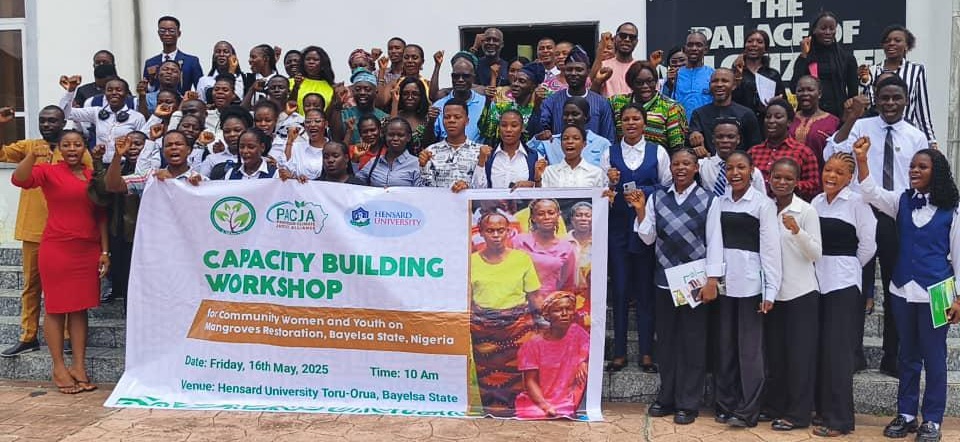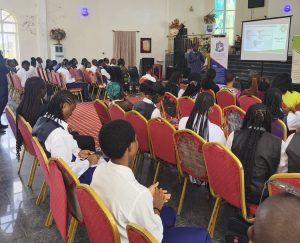
Written by Mercy Stephen
Climate & Sustainable Development Network (CSDevNet), representing the Pan African Climate Justice Alliance (PACJA) officially signed a landmark Memorandum of Understanding (MoU), marking a transformative collaboration focused on advancing climate justice, environmental education, and sustainable development in Nigeria.
This 3-year strategic partnership with Hensard University seeks to strengthen the interface between academic research and practical climate solutions.
The initiative kicked off with a capacity-building workshop titled “Capacity Building Training for Community Women and Youth on Mangroves Restoration,” held on the university campus in Toru-Orua.
The event trained 100 participants including 30 women and 70 students in practical mangrove restoration techniques, while also promoting environmental stewardship, sustainable livelihoods, and inclusive community engagement.

Speaking at the event, on behalf of Vice-Chancellor Prof. Dileep Kumar, Prof. Femi Shaka, Dean of Communication and Media Studies, emphasized the transformative power of education and community action.
“This capacity-building workshop on mangrove restoration was organized with the hope that we can open new doors of opportunity for our participants,” said Prof. Kumar. “Education is more than the acquisition of information; it’s about making a real difference by harnessing a movement.”
Prof. Aduabobo Ibitoru-Hart, a board member of CSDevNet, was represented by Bayelsa State Coordinator Mr. Patrick Amaibi.
He underscored the ecological significance of mangroves, calling them “the backbone of coastal resilience.”
He elaborated on their critical role in preventing erosion, supporting biodiversity, and mitigating climate change.
“Our goal is not only to restore a pilot mangrove site but also to develop a comprehensive community action plan and build momentum for long-term restoration efforts,” said Amaibi. “This aligns with Nigeria’s climate targets and supports the Sustainable Development Goals, particularly SDG 13 (Climate Action) and SDG 5 (Gender Equality).”
Mr. Stephen Abu, National Coordinator of CSDevNet, reiterated the urgency of climate action and advocated for reforestation as well as behavioral changes at the grassroots level to protect the environment and ensure a sustainable future.
The workshop concluded with a symbolic tree-planting ceremony involving students, faculty, and organizers.
Speaking on behalf of the participants, Miss Mary Domotimi, a student, expressed appreciation for the opportunity to gain practical experience in environmental conservation.
“This experience has not only educated us but inspired us to take action in our own communities,” she said.
The initiative represents a meaningful step toward integrating climate education, gender inclusion, and community empowerment into Nigeria’s broader environmental and sustainable development agenda.
What were the conclusions of the event?
- Successful Capacity Building:
The workshop effectively trained 100 participants 30 women and 70 students equipping them with practical skills in mangrove restoration and fostering a deeper understanding of climate action and environmental stewardship. - Community Empowerment and Inclusion:
Emphasis was placed on gender inclusion and youth engagement, aligning with SDG 5 (Gender Equality) and SDG 13 (Climate Action), and empowering participants to become environmental champions within their communities. - Institutional Commitment:
Strong support from Hensard University leadership and CSDevNet demonstrated a shared commitment to integrating climate education with community-based solutions, reinforcing the importance of academia-civil society partnerships. - Symbolic Action for Lasting Impact:
A tree-planting ceremony capped the event, symbolizing a unified commitment to ecological restoration and serving as a launchpad for the pilot mangrove restoration site. - Pathway to Sustainable Development:
The event set the foundation for a long-term restoration plan, contributing to Nigeria’s climate goals and reinforcing the role of education, advocacy, and local action in tackling environmental challenges.
